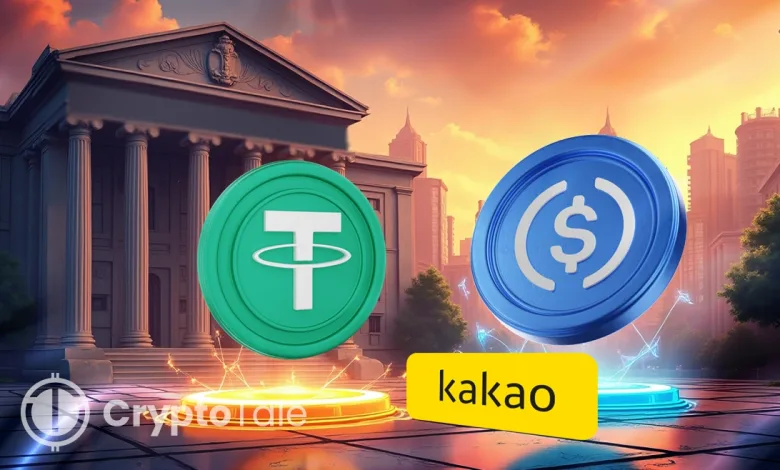Kakao Sets Sights on Launching Its Own Won-Based Stablecoin

- Kakao launches a stablecoin task force backed by its core fintech arms and ecosystem.
- Kakao aims to integrate a won-pegged stablecoin into KakaoTalk and Kakao Pay.
- With AI and stablecoins, Kakao shifts focus to future tech amid slowing growth.
Kakao has also officially established a specialized stablecoin task force to fast-track its South Korean entry into the digital currency environment. The group plans to issue a Korean-won-backed stablecoin and mobilize company-wide resources to secure a first-mover advantage.
Won-Based Stablecoin: Kakao’s Core Fintech Units Drive the Push
Kakao has established a task force made up of the CEOs from its core financial arms, Kakao, Kakao Pay, and Kakao Bank, to maintain leadership coherence across the ecosystem. All their affiliates address key stablecoin pillars, such as the platform, payment considerations, and banking infrastructure. This structure enables the seamless coordination and implementation of business units.
Weekly meetings are already being held to distribute tasks, monitor progress, and discuss regulatory changes. Each affiliate has developed working-level teams that execute operational strategies. The project is supposed to be extended by joining Kakao Games and Kakao Pay Securities.
This stablecoin will be Korean won-pegged, and it will be part of the ecosystem of Kakao. A wallet-embedded idea in KakaoTalk is planned, including payment by cash via Kakao Pay, and deposit control via Kakao Bank. Kakao intends to attract a large portion of the token economy in Korea through its integrated infrastructure.
Kaia, Tether, and Blockchain Legacy Support Kakao’s Strategy
Kakao has prior experience in blockchain through its former subsidiary, Ground X, which launched the Klaytn token back in 2019. Despite its independent operation, Kakao affiliates continue to hold a position on the governance board of Kaia, retaining their impact in the blockchain sector.
Kaia partnered with Tether to support USDT on its network, thus strengthening cross-chain stablecoin functionality. Kakao’s still being involved in the governance of Kaia may imply a long-term interest in blockchain. These all provide Kakao with a competitive advantage in rolling out and scaling up a stablecoin.
The company’s blockchain history enables the rapid implementation of stablecoin technologies in its digital services. Kakao can create a full-scale currency network by partnering with payment and banking tools.
Regulatory Momentum and Market Dynamics Push Kakao Forward
South Korea is also taking steps in regulating digital assets, as three stablecoin bills have already been introduced to the National Assembly. Following the wave of institutionalization, Kakao is matching the new frameworks to dominate the market.
U.S. tech companies such as PayPal and Meta have already begun implementing stablecoins on a global scale, causing Korean companies to act. The strategy by Kakao seems to be an attempt to preempt external digital currencies in the digital payments in Korea. It is also symbolic of a wider national movement of monetary innovation in fintech.
Domestic stablecoin activity is rising, with Toss and Naver also exploring digital won projects. However, Kakao’s combined control over the platform, bank, and payment gives it unmatched synergy. That synergy could position Kakao as Korea’s first mainstream private issuer of a stablecoin.
Related: Hong Kong Launches Stablecoin Licensing Amid Market Skepticism
Strategic Pivot Amid Business Slowdown and Token Economy Growth
Kakao is seeking stablecoins as one of the solutions to a lull in its content and entertainment businesses in recent years. Poor results in webtoons and games have depressed quarterly profits and diminished investor confidence. Kakao considers the stablecoin market as a new driver of long-term growth.
The global stake of stablecoins has grown in the world economy with a market capitalization of over $257 billion. Locally, Korea reported stablecoin transaction volumes of over $60 billion during the first half of the year. Kakao plans to use this momentum to create a future-proof business line.
Kakao is also working on an AI agent service in a partnership with OpenAI. The two thrusts into digital currency and AI mark a strategic repositioning of investment into the future. Today, Kakao puts stablecoins at the epicentre of its ambitions to restore growth and technology supremacy.




